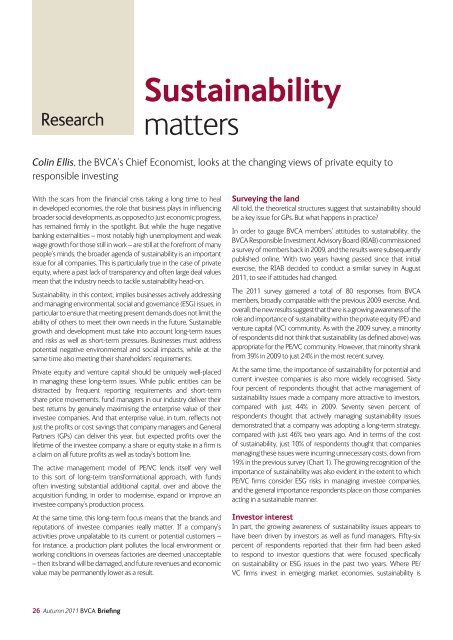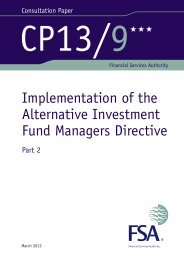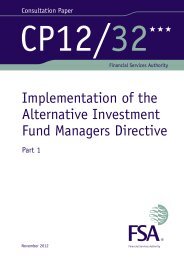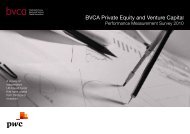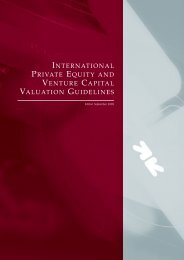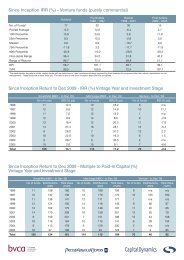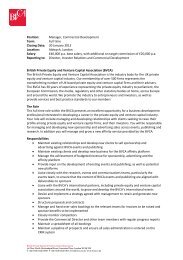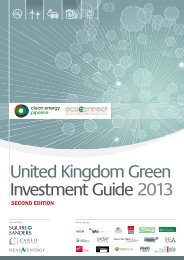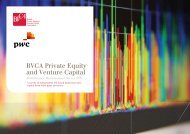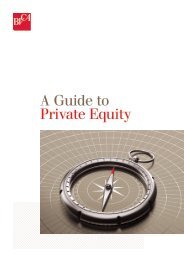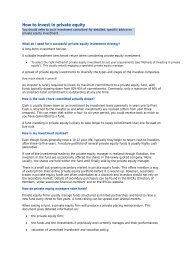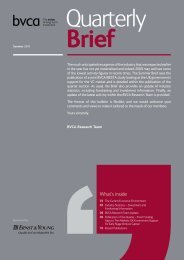Create successful ePaper yourself
Turn your PDF publications into a flip-book with our unique Google optimized e-Paper software.
Research<br />
Colin ellis, the <strong>BVCA</strong>’s Chief Economist, looks at the changing views of private equity to<br />
responsible investing<br />
With the scars from the financial crisis taking a long time to heal<br />
in developed economies, the role that business plays in influencing<br />
broader social developments, as opposed to just economic progress,<br />
has remained firmly in the spotlight. But while the huge negative<br />
banking externalities – most notably high unemployment and weak<br />
wage growth for those still in work – are still at the forefront of many<br />
people’s minds, the broader agenda of sustainability is an important<br />
issue for all companies. This is particularly true in the case of private<br />
equity, where a past lack of transparency and often large deal values<br />
mean that the industry needs to tackle sustainability head-on.<br />
Sustainability, in this context, implies businesses actively addressing<br />
and managing environmental, social and governance (ESG) issues, in<br />
particular to ensure that meeting present demands does not limit the<br />
ability of others to meet their own needs in the future. Sustainable<br />
growth and development must take into account long-term issues<br />
and risks as well as short-term pressures. Businesses must address<br />
potential negative environmental and social impacts, while at the<br />
same time also meeting their shareholders’ requirements.<br />
Private equity and venture capital should be uniquely well-placed<br />
in managing these long-term issues. While public entities can be<br />
distracted by frequent reporting requirements and short-term<br />
share price movements, fund managers in our industry deliver their<br />
best returns by genuinely maximising the enterprise value of their<br />
investee companies. And that enterprise value, in turn, reflects not<br />
just the profits or cost savings that company managers and General<br />
Partners (GPs) can deliver this year, but expected profits over the<br />
lifetime of the investee company: a share or equity stake in a firm is<br />
a claim on all future profits as well as today’s bottom line.<br />
The active management model of PE/VC lends itself very well<br />
to this sort of long-term transformational approach, with funds<br />
often investing substantial additional capital, over and above the<br />
acquisition funding, in order to modernise, expand or improve an<br />
investee company’s production process.<br />
At the same time, this long-term focus means that the brands and<br />
reputations of investee companies really matter. If a company’s<br />
activities prove unpalatable to its current or potential customers –<br />
for instance, a production plant pollutes the local environment or<br />
working conditions in overseas factories are deemed unacceptable<br />
– then its brand will be damaged, and future revenues and economic<br />
value may be permanently lower as a result.<br />
26 Autumn 2011 <strong>BVCA</strong> <strong>Briefing</strong><br />
Sustainability<br />
matters<br />
Surveying the land<br />
All told, the theoretical structures suggest that sustainability should<br />
be a key issue for GPs. But what happens in practice?<br />
In order to gauge <strong>BVCA</strong> members’ attitudes to sustainability, the<br />
<strong>BVCA</strong> Responsible Investment Advisory Board (RIAB) commissioned<br />
a survey of members back in 2009, and the results were subsequently<br />
published online. With two years having passed since that initial<br />
exercise, the RIAB decided to conduct a similar survey in August<br />
2011, to see if attitudes had changed.<br />
The 2011 survey garnered a total of 80 responses from <strong>BVCA</strong><br />
members, broadly comparable with the previous 2009 exercise. And,<br />
overall, the new results suggest that there is a growing awareness of the<br />
role and importance of sustainability within the private equity (PE) and<br />
venture capital (VC) community. As with the 2009 survey, a minority<br />
of respondents did not think that sustainability (as defined above) was<br />
appropriate for the PE/VC community. However, that minority shrank<br />
from 39% in 2009 to just 24% in the most recent survey.<br />
At the same time, the importance of sustainability for potential and<br />
current investee companies is also more widely recognised. Sixty<br />
four percent of respondents thought that active management of<br />
sustainability issues made a company more attractive to investors,<br />
compared with just 44% in 2009. Seventy seven percent of<br />
respondents thought that actively managing sustainability issues<br />
demonstrated that a company was adopting a long-term strategy,<br />
compared with just 46% two years ago. And in terms of the cost<br />
of sustainability, just 10% of respondents thought that companies<br />
managing these issues were incurring unnecessary costs, down from<br />
19% in the previous survey (Chart 1). The growing recognition of the<br />
importance of sustainability was also evident in the extent to which<br />
PE/VC firms consider ESG risks in managing investee companies,<br />
and the general importance respondents place on those companies<br />
acting in a sustainable manner.<br />
investor interest<br />
In part, the growing awareness of sustainability issues appears to<br />
have been driven by investors as well as fund managers. Fifty-six<br />
percent of respondents reported that their firm had been asked<br />
to respond to investor questions that were focused specifically<br />
on sustainability or ESG issues in the past two years. Where PE/<br />
VC firms invest in emerging market economies, sustainability is


